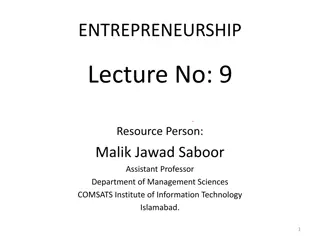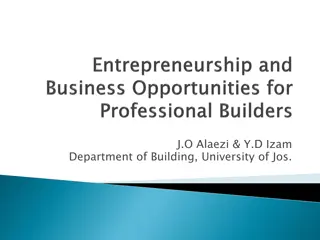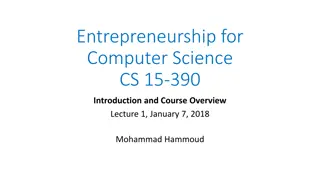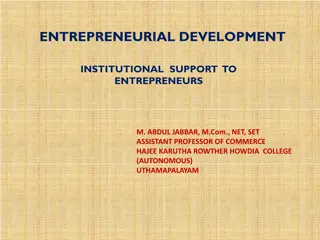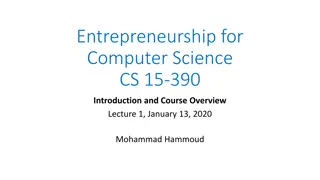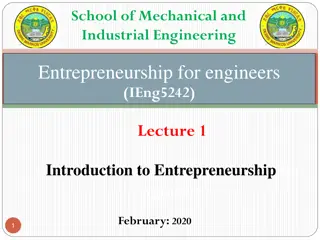Institutional Support for Entrepreneurship Development in India
The institutional support for entrepreneurship development in India is provided at various levels including Central Government, State Government, Non-Government Support Systems, and District Industries Centers. Key institutions such as the National Board for Micro, Small, and Medium Enterprises (NBMSME) and the National Commission for Enterprises in the Unorganized Sector (NCEUS) have been established to address the challenges faced by enterprises in the unorganized sector. Additionally, support measures like the Small Scale Industries Board (SSIB) and the National Bank for Agriculture and Rural Development (NABARD) play crucial roles in promoting sustainable rural development and supporting small-scale industries. These initiatives aim to facilitate credit flow, technical assistance, and marketing support for entrepreneurs, contributing to the growth of MSMEs in the country.
Download Presentation

Please find below an Image/Link to download the presentation.
The content on the website is provided AS IS for your information and personal use only. It may not be sold, licensed, or shared on other websites without obtaining consent from the author.If you encounter any issues during the download, it is possible that the publisher has removed the file from their server.
You are allowed to download the files provided on this website for personal or commercial use, subject to the condition that they are used lawfully. All files are the property of their respective owners.
The content on the website is provided AS IS for your information and personal use only. It may not be sold, licensed, or shared on other websites without obtaining consent from the author.
E N D
Presentation Transcript
Entrepreneurship Development BCA II
Concept Objectives Process Problems Me Measurement
Institutional Support for ED Institutional support system has been designed at following four levels: 1. Central Government 2. State Government 3. Non-Government Support System 4. District Industries Centers (DIC).
Institutional Support for ED 1. Central Government Institutions: The Government Formulated the Micro, Small and Medium Enterprises: Development Act, 2006 and established the National Board for Micro, Small and Medium Enterprises (NBMSME) and made rules there under in the year 2006. This Board examines the factors affecting promotion and development of MSMEs and reviews policies and programmes from time to time relating to these enterprises, from time to time and makes recommendations to the Government in formulating the policies for the growth of MSMEs.
Institutional Support for ED 1. Central Government Institutions: The Government of India constituted the National Commission for Enterprises in the Unorganized Sector (NCEUS) to examine the problems of the enterprises in the unorganized/informal sector. The Commission has made recommendations to provide technical, marketing and credit support to these enterprises.
Institutional Support for ED 1. Central Government Institutions Some such support measures are being discussed briefly below: I.Small Scale Industries Board (SSIB) It was established in 1954 to provide effective coordination and inter- institutional linkages for the benefit of small scale sector. It consists of the following members: a. Union Industry Minister b. State Industry Minister ADVERTISEMENTS: c. Selected members of Parliament d. Secretaries of department concerned e. Eminent experts in the field
II. National Bank for Agriculture and Rural Development (NABARD) NABARD is designated as an apex development bank in the country. Established in 1982 by a Special Act of the Parliament, with a mandate to uplift rural India by facilitating credit flow in agriculture, cottage and village industries, handicrafts and small-scale industries. It is also required to support non-farm sector while promoting other allied economic activities in rural areas. NABARD functions to promote sustainable rural development for attaining prosperity of rural areas in India.
III.Small Industries Development Organization (SIDO) The SIDO has promoted the following institutes and center and is responsible for their management: Small Industries Service Institutes (SISI) Product-cum-Process Development Centers Regional Training Centers (RTCs) Establishment of Training Institutes i. ii. iii. iv.
Institutional Support for ED 1. Central Government Institutions IV. National Small Industries Corporation (NSIC): The National Small Industries Corporation (NSIC) Ltd. was established by the Government as a Public Sector Company in 1955. Its main functions are: i. To arrange for Supply of machinery and equipment. ii. To arrange Provision of financial assistance. iii. To provide Assistance for arrangement of raw materials. iv. To aid establishment of technology transfer centers. v. To make arrangement of marketing assistance.
Institutional Support for ED 1. Central Government Institutions Its main functions are: vi. To ensure priority in government purchase programme vii. To promote, aid, and foster the growth of micro and small enterprises in the country, generally on a commercial basis viii. To provides a variety of support services to micro and small enterprises catering to their different requirements in the areas of raw material procurement; product marketing; credit rating; acquisition of technologies; adoption of modern management practices, arranging for business partners, ensuring technology transfer programmes through missions, delegations and expositions etc.
Entrepreneurship Development Institute of India: The Technical Service Centers (TSCs), established by NSIC are functioning in different parts of the country, providing diverse technical support to the small scale sector. Three national entrepreneurship development institutes namely: 1. National Institute for Micro, Small and Medium Enterprises (NI- MSME) at Hyderabad, 2. National Institute for Entrepreneurship and Small Business Development (NIESBUD) at NOIDA (Uttar Pradesh) 3. Indian Institute of Entrepreneurship (IIE) at Guwahati, as autonomous societies.
1. National Institute for Micro, Small and Medium Enterprises (NI-MSME) at Hyderabad, ni-msme, since its inception in 1960 by the Government of India, has taken gigantic strides to become the premier institution for the promotion, development and modernization of the SME sector. An autonomous arm of the Ministry of Micro, Small and Medium Enterprises (MSMEs), the Institute strives to achieve its avowed objectives through a gamut of operations ranging from training, consultancy, research and education, to extension and information services.
. National Institute for Entrepreneurship and Small Business Development (NIESBUD) NIESBUD is an apex body established by Ministry of Micro, Small & Medium Enterprises. The Government of India for coordinating, training and overseeing the activities of various institutions/agencies engaged in entrepreneurship development particularly in the area of small industry and small business. Its main activities are to evolve effective training strategies and methodology, standardising model syllabi for training various target groups, formulating scientific selection procedure, developing training aids, manuals and tools, facilitating and supporting Central/State/ Other agencies in organising entrepreneurship development programmes, conducting training programmes for promoters, trainers and entrepreneurs and undertaking research and exchange experiences globally
3. Indian Institute of Entrepreneurship (IIE) at Guwahati, as autonomous societies. The Indian Institute of Entrepreneurship (HE) was established in the year 1993 in Guwahati by the erstwhile Ministry of Industry (now the Ministry of Micro, Small and Medium Enterprises), Government of India as an autonomous national institute with an aim to undertake training, research and consultancy activities in small and micro enterprises focusing on entrepreneurship development.
The main objectives of the institute are: (1) To organize and conduct training for entrepreneurship development, (2) To evolve strategies & methodologies for different target groups & locations & conduct field tests, (3) To identify training needs and offer training programmers to Government and non-Government organisations engaged in promoting and supporting entrepreneurship etc.
Institutional Support for ED 1. Central Government Institutions (v) Small Industries Development Bank of India (SIDBI) (vi) National Board for Micro, Small and Medium Enterprises (NBMSME) (vii) Khadi and Village Industries Commission(KVIC) (viii) Mahatma Gandhi Institute for Rural Industrialization (MGIRI) (x) National Institute for Small Industry Extension Training (NISIET)
Institutional Support for ED 2. State Government Institutions I. State Financial Corporation (SFC) Its main objectives are: i. To provide term loans for the acquisition of land, building, plant and machinery. ii. To promote of self-employment. iii. To encourage women entrepreneurs iv. To bring about expansion of industry v. To provide seed capital assistance.
Institutional Support for ED 2. State Government Institutions (ii) State Small Industries Development Corporation (SSIDC): The State Small Industries Development Corporations (SSIDC) were set up in various states under the companies act 1956, as state government undertakings to cater to the primary developmental needs of the small tiny and village industries in the state/union territories under their jurisdiction.
Institutional Support for ED 2. State Government Institutions (ii) State Small Industries Development Corporation (SSIDC) SSIDC provides the following important functions: i. Procurement and distribution of raw materials. ii. Supply of machine on hire-purchase basis iii. Construction of industrial estates. iv. Providing assistance for marketing of products of SSI.
Institutional Support for ED 2. State Government Institutions (iii) Technical Consultancy Organizations (TCOs): Services of TCOs include: i. Preparation of project profiles. ii. Undertaking industrial potential surveys. iii. Identification of potential entrepreneurs. iv. Undertaking market research. v. Project supervision and rendering technical and administrative assistance. vi. Conducting EDPs.
Institutional Support for ED 2. State Government Institutions (iv) Khadi and Village Industries Commission (KVIC): It is engaged in the development of khadi and village industries in rural areas. Main objectives of KVIC are: i. To provide employment in rural areas. ii. To help in skill improvement. iii. To bring about rural industrialization. iv. To facilitate transfer of technology.
Institutional Support for ED 3. Non-Government Institutions Besides the Central Government and the State Government agencies, there are some Non-Governmental agencies that are also supporting the cause of small scale industries in the country. These agencies include Non- Government organizations and industry associations. They provide a common platform to voice SSI needs and initiate co-operative efforts.
Institutional Support for ED 3. Non-Government Institutions (I) Indian Council of Small Industries (ICSI) It was established in 1979 to help tiny, cottage and small industries and artisans of rural areas Main functions of ICSI are: i. Information dissemination. ii. Entrepreneurship development. iii. Consultancy and managerial support. iv. Training and research.
Institutional Support for ED 3. Non-Government Institutions (II) Laghu Udyog Bharti (LUB): Laghu Udyog Bharti (LUB) was founded in 1995 to promote and safeguard the interest of tiny and small scale industries It is responsible for undertaking entrepreneurial training, providing support for technology up gradation and marketing services. LUB performs following functions: i. Entrepreneurial training. ii. Technology up gradation. iii. Marketing services.
Institutional Support for ED 3. Non-Government Institutions (III) India SME Technology Services Ltd.: India SME Technology Services Ltd. (ISTSL) provides a platform where micro, small and medium enterprises can tap opportunities at the global level for acquisition of new and emerging technology or establish business collaboration. Their mission is: To render professional services for technology transfer and attendant support services in order to enhance market competitiveness of micro, small and medium enterprises and promote sustainable development.
Institutional Support for ED 3. Non-Government Institutions (IV) Credit Guarantee Fund Trust for Micro and Small Industries: A Credit Guarantee Fund Scheme for small industries was launched by the Government and the SIDBI set up the Credit Guarantee Fund Trust for Small Industries (CGTSI), with a mission to implement the credit guarantee fund scheme for micro and small enterprise in August 2000 to ensure better flow of credit to micro and small enterprises by minimizing the risk perception of banks/ financial institutions in lending without collateral security.
Institutional Support for ED 3. Non-Government Institutions (V) Federation of Associations of Small Industries of India (FASII) It was promoted in 1959 to represent the problems of SSIs with the Government and liaisoning with other agencies involved in promotion of SSI sector. Its objectives are as follows: i. To promote the development of small scale, tiny and cottage industries; ii. To cooperate with industrial business, educational institutions in collecting and exchanging information pertaining to the small scale sector; iii. To undertake professional, technical and management consultation services;
iv. To undertake studies, surveys and research assignments; v. To further the cause of small industries by interacting with Union and State Governments and other bodies; vi. To establish and operate trade centres display centres, sub- contracts exchanges and other promotional institutions for the benefit of the small scale sector and vii. To establish test centres, laboratories and common facility centres for the SSI sector.
Institutional Support for ED 3. Non-Government Institutions (VI) World Association of Small and Medium Enterprises (WASME): The World Association for Small and Medium Enterprises was founded in 1981 to ensure business cooperation among its members It facilitates: i. Technology transfer ii. Manpower training iii. Maintaining a register of experts/consultants, organising seminars and conferences iv. And acts as a clearing house of information and marketing services etc.
Institutional Support for ED 3. Non-Government Institutions (VII) Federation of Indian Chambers of Commerce and Industry (FICCI): The FICCI was established in 1927 as the national agency through which the chambers of commerce and trade association in India could crystallize their views on current economic problems. It serves as the coordinating agency for the commercial and industrial interests as represented by various chambers of commerce and trade associations. The Federation maintains very close relations with the Union Government and is also represented on over 65 advisory committees appointed by the Government and other leading organizations.
Institutional Support for ED 3. Non-Government Institutions (VIII) Small and Medium Business Development Chamber of India (SME Chamber of India): The chamber puts all its efforts for the development and growth of MSMEs by organising various activities to accomplish its objectives. The Chamber provides information and guidance to new and existing entrepreneurs in effectively managing and growing their business. The Chamber has developed key strategies to promote and support the MSME sector. The Chamber also gives importance to and encourages MSMEs to adopt innovative ideas and concepts for the promotion of their business.
The chamber organises: i. Seminars ii. Conferences, iii. Workshops and Training Programs iv. And other trade promotional activities to educate & create awareness among MSMEs. v. The Chamber recognizes successful entrepreneurs by conferring National & International Level MSME and Entrepreneurship Excellence Awards for their outstanding achievements in the fields of Manufacturing, Services, International Trade, Finance, Agro & Food Processing, IT and IT Enabled Services, Telecommunication, Research, Technology Development and other sectors.
Institutional Support for ED 3. Non-Government Institutions (IX) Associated Chambers of Commerce and Industry of India (ASSOCHAM): founded in December 1920 (X) Confederation of Indian Industry (CII): It was created in 1992 by changing the name of Confederation of Engineering Industry. (XI) Federation of Indian Exporters Organization (FIEO): This is an apex organization set up by the Ministry of Commerce in the year October 1965.
Institutional Support for ED 3. Non-Government Institutions (XII) Rural Small Business Development Centre (RSBDC) It is the first of its kind set up by the world association for small and medium enterprises and is sponsored by NABARD. It works for the benefit of socially and economically disadvantaged individuals and groups. It aims at: i. Providing management and technical support to current and prospective micro and small entrepreneurs in rural areas. ii. Organizing several programmes on rural entrepreneurship, skill up gradation workshops, mobile clinics and trainers training programmes, awareness and counseling camps in various villages of North India.
Institutional Support for ED 3. Non-Government Institutions (XIII) Entrepreneurship Development Institute of India (EDI): The Entrepreneurship Development Institute of India (EDII), an autonomous body and not-for-profit institution, set up in 1983, is sponsored by apex financial institutions, namely the IDBI Bank Ltd, IFCI Ltd. ICICI Ltd and State Bank of India (SBI). The Institute is registered under the Societies Registration Act 1860 and the Public Trust Act 1950
Institutional Support for ED 3. Non-Government Institutions Courses offered by EDI (a) Post Graduate Diploma in Management Development Studies (PGDM-DS) (b) Post Graduate Diploma in Management Business Entrepreneurship (PGDM-BE) (c) Post Graduate Diploma in Management Development Studies (PGDM-DS) The entrepreneurship process at EDI: Students are taught to identify opportunities and check on their feasibility. Through mentoring and guidance the students prepare a business plan. They are given a platform to pitch their ideas to banks and investors, so that they can launch their own venture.
Institutional Support for ED 3. Non-Government Institutions (XIV) Indian Investment Centre (IIC) The Indian Investment Centre is a Government of India organization and enjoys nearly more than three decades of rich understanding in investment promotion.
Institutional Support for ED 4. District Industries Centres (DIC) & Industrial Estates In each district, there is one agency to deal with all requirements of small and village Industries. This is called District Industries Centre , The District Industries Centres have undertaken various programmes for investment promotion at the grass root level such as organizing seminars workshops, extending support for trade fairs and exhibitions organized by various Industry s associations. All the services and support required for MSME units under was the single roof of the District Industries Centre. The Centre has a separate wing to look after the special needs of cottage and house- hold industries as district from small industries.
Institutional Support for ED 4. District Industries Centres (DIC) & Indus- trial Estates In each district one agency to deal with all requirements of small and village Industries. This is called District Industries Centre The District Industries Centres have undertaken various programmes for investment promotion at the grass root level such as: i. Organizing seminars workshops, extending support for trade fairs and exhibitions organized by various Industries associations. ii. All the services and support required by for MSME units under the single roof of the District Industries Centre. The Centre has a separate wing to look-after the special needs of cottage and house- hold industries as district from small industries.
Institutional Support for ED 4. District Industries Centres (DIC) & Indus- trial Estates Administration: General Manager is the head of the District Industries Centre. The post of General Manager is of Joint/Deputy Commissioner Level. The General Manager has senior officers to assist him, such as Managers, Officers of all related fields.
Institutional Support for ED 4. District Industries Centres (DIC) & Indus- trial Estates Objectives of District Industries Centres (DIC): (i) To identify prospective entrepreneurs to take up viable projects. (ii) To identify viable projects and make demand survey on the available resources of the district and plan for promotion of viable industries in the area. (iii) To prepare viable and feasible project reports. (iv) To strengthen the guidance cell to solve the problems of the entrepreneurs.
Institutional Support for ED 4. District Industries Centres (DIC) & Indus- trial Estates (v) To maintain up to date data on SSI Sector. (vi) To recommend financial proposals to Orissa State Financial/ Corporation/Financial Institutions/Banks etc. (vii) To allot Govt, land/shed in Industrial Estates (viii) To recommend for power connection. (ix) To arrange for EDP training (x) To arrange exhibition, fair and publicity and visit of industrialists to Trade Fairs and different Industrial Estates of other States.
Institutional Support for ED 4. District Industries Centres (DIC) & Indus- trial Estates (ix) To arrange for EDP training (x) To arrange exhibition, fair and publicity and visit of industrialists to Trade Fairs and different Industrial Estates of other States. (xi) To solve the problems of the industrial units at the district level (xii) To monitor the health of existing SSI units and the progress of those in the pipeline. (xiii) To provide necessary marketing assistance. (xiv) To monitor the implementation of the Prime Minister s Rozgar Yojana. (xv) To assist revival of sick SSI Units. (xvi) To update the library in different DICs by procuring different hand books relating to industries
The important functions of DICS are discussed as follow: (i) Identification of Entrepreneurs (ii) (iv) Purchases of Fixed Assets: Provisional Registration:(iii) Permanent Registration:(v) Clearances from Various Departments:(vi) Assistance to Village Artisans and Handicrafts:(vii) Incentives and Subsidies(viii) Interest Free Sales Tax Loan(ix) Assistance of Import and Export(x) Fairs and Exhibitions(xi) Training Programmes(xii) Self-Employment for Unemployed Educated Youth






